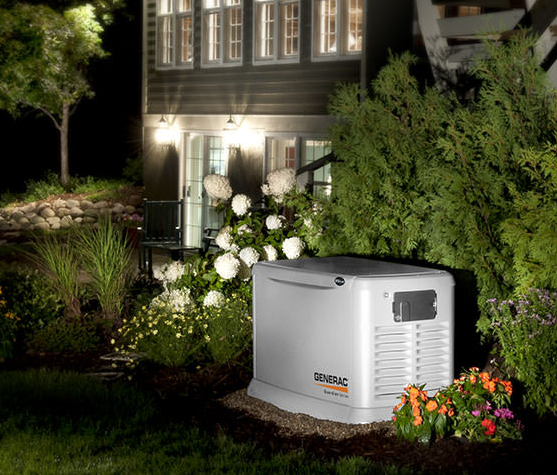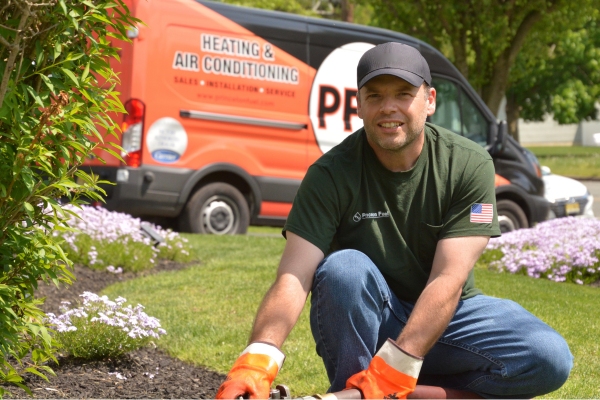
In regions where power interruptions are common due to weather or other disruptions, a reliable power generator is not just a convenience; it’s a necessity. It ensures continuous power, preventing sudden blackouts’ inconvenience and potential damage. Choosing the best standby generator with the right features enhances efficiency and reliability and extends its lifespan.
PFO Heating & Air Conditioning is a leader in providing high-quality whole-house generators, known for its expertise and comprehensive product range. This article will detail the top nine features to look for in a power generator, helping you make a well-informed choice suitable to your needs.
Top 9 Essential Features to Consider When Choosing a Power Generator
Contents
- 1 Top 9 Essential Features to Consider When Choosing a Power Generator
- 1.1 1. Standby Power Output and Capacity
- 1.2 2. Whole-House Generator Fuel Type and Efficiency
- 1.3 3. Automatic Transfer Switch (ATS)
- 1.4 4. Backup Generator Noise Level
- 1.5 5. Whole-House Generator Size
- 1.6 6. Best Standby Generator Start-Up Mechanism
- 1.7 7. Run Time and Fuel Tank Capacity
- 1.8 8. Whole-House Generator Safety Features
- 1.9 9. On-Demand Generator Maintenance and Warranty
- 2 Conclusion
- 3 Call PFO Heating & Air Conditioning for Expert Backup Generator Solutions
Below, we discuss some aspects to consider when choosing a whole-house generator.
1. Standby Power Output and Capacity

Power output and capacity are critical factors in choosing a power generator. These terms refer to the amount of electricity a generator can produce, usually measured in watts. Home appliances and systems have specific wattage requirements; for instance, a refrigerator may need 600 watts, while central air conditioning can require up to 4000 watts. Ensuring that a generator’s capacity exceeds the total wattage needed by all appliances and systems at peak usage is essential for effective performance.
To determine the necessary power output for your home, add up the wattage requirements of all devices that need to operate during a power outage. Comparing generators, you might find models ranging from 5,000 to over 20,000 watts. A smaller home with fewer appliances might manage with a 10,000-watt model, whereas a larger home with comprehensive systems might require at least 20,000 watts to ensure seamless power supply during interruptions.
Talk to Our Generator Experts! Need guidance on installing a whole-house generator? Reach out to PFO Heating & Air Conditioning for professional advice and detailed insights.
2. Whole-House Generator Fuel Type and Efficiency
The generator’s fuel type is a pivotal decision factor, impacting everything from efficiency to operational costs. Common fuel options include gasoline, diesel, propane, and natural gas. Each type has its merits and considerations; diesel generators are known for their longevity and robust performance, while gas units are favored for their convenience and lower emission levels.
Fuel efficiency directly affects a generator’s operational cost and runtime. More efficient units can produce more power with less fuel, making them cost-effective over time. Gasoline generators may be less expensive initially but often have higher running costs and shorter lifespans. Propane units, while cleaner than diesel and gasoline, require secure fuel storage. Each fuel type offers distinct advantages and drawbacks, making choosing based on specific needs, availability, and environmental considerations crucial.
3. Automatic Transfer Switch (ATS)
An Automatic Transfer Switch (ATS) is critical in managing power continuity during an outage. It automatically detects a power loss, activating the generator within seconds and ensuring a seamless transition from the main power supply to the generator. This functionality eliminates manual intervention, providing immediate relief from power disruptions.
Integrating an ATS offers improved convenience and safety, minimizing the disruption caused by outages and protecting electronic devices from damage due to sudden power fluctuations. Most modern generators come with an ATS that has already been installed and designed to work compatibly with the specific model’s output and features. This setup ensures that the generator operates only when necessary, enhancing fuel efficiency and extending the unit’s lifespan.
Stay Powered with PFO Heating & Air Conditioning! Looking for dependable power solutions? Get in touch with PFO Heating & Air Conditioning to see how our whole-house generators can keep your home running smoothly.
4. Backup Generator Noise Level
Noise level is crucial when selecting a backup generator, especially in residential areas where high noise levels can disrupt daily life and contravene local noise ordinances. Generators are rated in decibels (dB), and typical models range from about 60 dB (comparable to normal conversation) to over 100 dB (akin to a motorcycle nearby).
Understanding decibel levels helps in choosing a generator that minimizes disruption. For instance, models designed for quiet operation often feature sound-dampening technologies and special housing that can significantly reduce noise output. These quieter models are particularly beneficial in densely populated areas or homes where noise could affect the quality of life. Investing in a low-noise generator ensures power backup without the added stress of loud operational sounds.
5. Whole-House Generator Size

Choosing the right size for the best standby generator is crucial for effectively balancing power needs. The generator’s size is typically measured in kilowatts (kW), and it determines the total number of appliances and systems it can power simultaneously. For instance, a small home may require a 10 kW generator to run essential appliances. In contrast, a larger home with multiple air conditioners and a well pump might need a generator with a capacity of 20 kW or more to handle all potential loads comfortably.
Generators come in various sizes to accommodate different residential and commercial needs. For example, a typical range might include:
- 10 kW models suitable for basic emergency power.
- 20-30 kW models for average-sized homes.
- 40-50 kW units designed for large properties or homes with high power demands.
Properly sizing a generator ensures efficient operation without the risk of overloading the system, thereby safeguarding both the generator and home appliances.
Schedule Your Consultation Today! Get ready for seamless power at home. Contact PFO Heating & Air Conditioning now to explore our whole-house generator solutions.
6. Best Standby Generator Start-Up Mechanism
The start-up mechanism of a standby generator significantly affects its convenience and reliability. Common types include manual start, automatic start, and remote start systems. Manual start generators require physical engagement to begin operating, which can be cumbersome during inclement weather or if the user is not physically present at home.
Automatic start systems activate immediately upon detecting a power loss, providing seamless recovery without user intervention. Remote start allows users to operate the generator from a distance, adding convenience for large properties or individuals with mobility issues.
The choice of start-up mechanism should align with user preferences and needs. Automatic start is optimal for continuous operation of medical equipment or those often away from home, while manual systems may better suit budget-conscious users with less critical needs. Properly matching the start-up mechanism enhances the generator’s effectiveness and user satisfaction.
7. Run Time and Fuel Tank Capacity

Longer run times in generators are crucial during extended outages. They provide continuous operation without frequent refueling—a key advantage in severe weather or when fuel is scarce. Run time largely depends on fuel tank capacity; a larger tank means longer operation before refueling is necessary.
For example, a 500-gallon propane tank could sustain several days of use, while a 20-gallon gasoline tank might need daily refueling with heavy usage. Enhancing run time and fuel efficiency can be achieved with an eco-mode feature that adjusts power output to match the load and through regular maintenance like checking oil and cleaning air filters, thereby improving both efficiency and lifespan of the generator.
Ensure Your Home’s Energy Security! Protect your home from power outages. Call PFO Heating & Air Conditioning to find the best whole-house generator for your needs.
8. Whole-House Generator Safety Features

Safety features in whole-house generators are crucial for preventing damage and ensuring safe operation. Key features include low-oil shutdown, which automatically stops the generator to avoid engine damage when oil is low. Overload protection also shuts down the generator if power demand exceeds its capacity, protecting the unit and connected appliances. Additionally, spark arrestors are essential for fire prevention, trapping or extinguishing sparks from the exhaust system.
Ensuring that a generator meets regulatory safety standards and local regulations is crucial for compliance and safety assurance. Generators should be certified to meet specific standards set by organizations like the Underwriters Laboratories (UL) and the Environmental Protection Agency (EPA), depending on the type of fuel used.
For enhanced safety, carbon monoxide detectors should be installed near the generator and in living areas to detect harmful emissions. Regular maintenance checks, proper ventilation, and secure installation away from windows and vents are additional safety practices that further secure the operation of backup generators, safeguarding both property and residents.
9. On-Demand Generator Maintenance and Warranty
Maintenance ease is critical for the long-term reliability of whole-house generators. Generators designed with accessible components and user-friendly maintenance procedures ensure that routine checks and repairs can be performed efficiently, reducing downtime and extending the unit’s lifespan. Regular upkeep, such as changing the oil, checking the coolant levels, and inspecting belts and batteries, can significantly enhance performance and reliability.
Warranty coverage is another important consideration when purchasing a backup generator. Look for warranties that offer extensive coverage over a long period and comprehensive support options. A good warranty protects against manufacturing defects. It also underscores the manufacturer’s confidence in their product. Together, effective maintenance and solid warranty coverage ensure the generator remains operational over many years, providing peace of mind and value for the investment.
Conclusion
Selecting the right power generator involves considering essential features such as power output, fuel type, noise level, size, start-up mechanism, run time, safety, maintenance, and warranty. Understanding these attributes ensures you choose the best standby generator that efficiently and reliably meets your needs. For expert advice and to explore a range of top-quality generators that embody these crucial features, contact PFO Heating & Air Conditioning. Ensure your peace of mind during power outages by choosing the best power solution for your home or business with PFO Heating & Air Conditioning.
Discover Our Range of Whole-House Generators! Explore the perfect generator options for your home. Contact PFO Heating & Air Conditioning to learn about our diverse selection.
Call PFO Heating & Air Conditioning for Expert Backup Generator Solutions
PFO Heating & Air Conditioning provides top-tier whole-house generator services throughout the Greater Princeton, NJ area. Our professionally certified technicians are thoroughly trained to offer outstanding maintenance, repairs, and installations for standby generators.
Whether you’re looking to repair a backup generator, install a new one, or ensure your current model is at peak performance, our expert team is ready to deliver precise services customized to meet your unique needs. PFO Heating & Air Conditioning is committed to providing competitively priced generator services on demand.
Choosing us means receiving dependable service, engaging with friendly and knowledgeable staff, and benefiting from clear pricing. Your satisfaction is our priority, which is why we back our services with a solid guarantee. Contact us today to book your service visit and receive a free in-home estimate.
Click here to contact us now or call us at (800) 253-9001 to find out more! Click the link to view our service area.

Related Articles:
- Uninterrupted Comfort: Benefits Of A Whole House Backup Generator Over A Portable Generator
- 10 Reasons Why Generator Installation Is A Smart Investment For Your Home
- Backup Generator Troubleshooting: What To Do When Your Generator Won’t Start
- Top 10 Culprits Behind Your Standby Generator’s Starting Troubles
- Common Whole House Generator Problems



